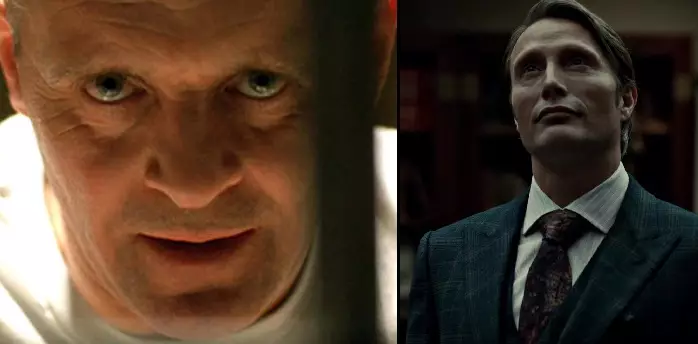
It's pretty hard to believe that around the world there are actual cannibals. It derives from tribes eating human flesh in order to quench their hunger, and the belief that it's a symbolic ritual.
However, no such excuse would wash these days, of course, and is a psychological problem.
For some reason, delving deeper into the mind of serial killers is ridiculously interesting. Thinking about how someone else's mind can be so different to your own, yet on the outside both you and them appear similar, is a never ending source of puzzlement and curiosity.
A lot of this may well be attributed to actors bringing certain psychopathic killers to life. The one that springs to mind straight away is Hannibal Lecter, from the Thomas Harris novels, who was portrayed by the brilliant Anthony Hopkins. And as a side note to Hopkins nailing the role of the psychiatrist, is Ted Levine's performance as Jame Gumb, or 'Buffalo Bill'.
The latter was a gay man who longs to be a transvestite, but psychologically disturbed to qualify for gender reassignment surgery. In order to become a woman, he kidnaps overweight women, leaves them in a well where he starves them long enough for their skin to become loose. When that happens, he skins them and makes a 'woman suit'.
Obviously this is all kinds of fucked up, and, if it was real, would be quite a unique case. Therefore we can't really begin to dissect his mind.
Hannibal Lecter, on the other hand, a straight up cannibal, is a little bit easier.
Psychology Today reports that in many cases, cutting up the human flesh is often sexually arousing. Removing the meat, peeling it and then having their way with it is enough to induce orgasms, according to cannibals, because the euphoria of being in control makes them feel so powerful.
Using Hannibal Lecter as an example again, in Hannibal, he gives Mason Verger, one of his patients, PCP. In his drugged-up state, Lecter hands him a shard of mirror and asks him to peel off his face. As he does so, the doc looks on, smoking, enjoying the scenario.
Credit: Universal Pictures
"People who have engaged in this act report feelings of euphoria or get a 'high' by performing the action to completion," Karen Hylen, the primary therapist at Summit Malibu Treatment Center in California, told Huffington Post. "These individuals have psychopathic tendencies and are generally not psychotic. They know exactly what they are doing."
Obviously it's not exactly news that those who devour human meat have psychotic tendencies - but how does it all begin?
Well, the first time someone kills and then eats a victim is pretty much a case-by-case thing. It may be down to childhood traumas, or it could be through curiosity, but according to Psychology Today, most of the time cannibals are isolated and resentful - loners.
Because they are alone, and are bitter about having no companions, they eat their victims to have a control over someone's life, and then they're always with them; never alone.
Karen Hylen claims that the first incident is usually some kind of twisted fantasy. However, after a bit of 'suck it and see', large amounts of dopamine are released in the brain, almost acting like a drug.
"The pleasure center of the brain becomes activated," according to Hylen, and then, as we know all too well, when you have that feeling that can only be created by that one thing, you crave it more.
All aspects of being a cannibal; hunting, killing, removing the skin and then eating, become part of the addiction "just as a cocaine addict becomes addicted to the process of cutting up lines before they ingest the drug itself."
Stepping into the shoes of a cannibal, as an actor, is, you'd assume is tough.
To make Anthony Hopkins' role as Dr Lecter convincing, it was going to take a bit more than simply memorising the lines and putting on a slightly creepy voice.
As soon as Hopkins read the script he had a vague idea in his head as to how the doctor would act, what he'd look like, how he should speak, and what he should wear.
"I read the script - and - boom! - I knew intuitively how to play him," he told Empire Online. "I knew how he looked and how he sounded."
Firstly, he imagined that Lecter would be made up of three people, a combination of Katharine Hepburn, Truman Capote and HAL from 2001: Space Odyssey.
Hepburn, a legendary actress, was outspoken and assertive, yet remained fairly mysterious due to distancing herself from the celebrity lifestyle. Capote was an author who was addicted to drugs and alcohol, but was very much a recluse, despite being in various relationships. His lover, Jack Dunphy, claimed they both lived different lives at different times. He also had distinctive yet odd vocal mannerisms, which undoubtedly had an impact on Lecter's character.
Finally, Hal, or HAL 9000, or even Heuristically programmed ALgorithmic Computer, was the final piece of Hopkins' puzzle, but was arguably the most important. Obviously there are no physical traits that can be compared, given that one is a computer, but Hal's soft, yet spine-chilling, macabre voice is one that you could imagine saying: "Good evening, Clarice."
Hal's voice. Credit: Metro-Goldwyn-Mayer
With regards to Lecter's physical appearance and clothes, it was a mixture of Jonathan Demme, the director, and the legendary actor's input.
"In terms of his physical appearance, it was Jonathan's idea that he be pale and he convinced me to stay out of the sun," Hopkins said. "It was my idea to give him dark, slicked-back hair. I also wanted him to wear a very tight prison uniform. That would suggest total control. After my first make-up session, I went to the mirror and thought - 'this is it'."
Featured Image Credit: Universal Pictures/NBCTopics: Science, TV and Film